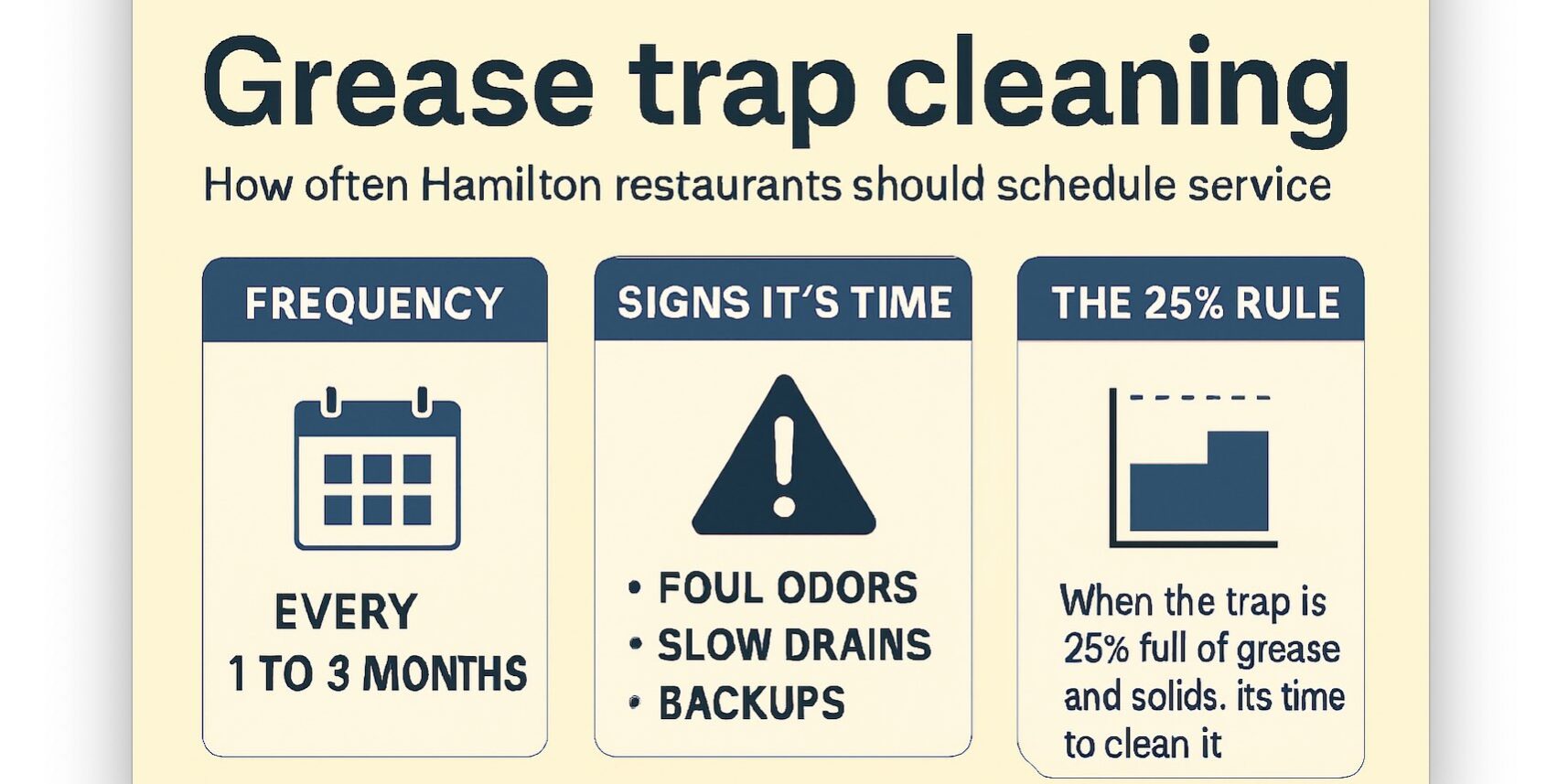Grease Trap Cleaning: How Often Hamilton Restaurants Should Do It
Avoid backups, fines, and foul smells with proper maintenance.
If you operate a restaurant, café, or commercial kitchen in Hamilton, you already know how important your grease trap is. This simple but vital plumbing device prevents fats, oils, and grease (FOG) from clogging up the city’s wastewater system—and your own pipes.
But here’s the thing: if your grease trap isn’t cleaned regularly, it stops working. That can lead to serious problems like foul odors, slow drains, expensive plumbing repairs, or even city fines.
So, how often should your Hamilton restaurant be cleaning its grease trap? Let’s break it down.
🧠 What Is a Grease Trap, Exactly?
A grease trap (or grease interceptor) is a plumbing device that captures FOG before it enters your main sewer line. As wastewater flows from sinks, dishwashers, and floor drains, the grease trap separates heavier solids and grease from the water.
Over time, that grease builds up—and that’s when cleaning becomes critical.
📅 How Often Should You Clean Your Grease Trap?
The industry standard is to clean your grease trap every 1 to 3 months, but this can vary depending on:
-
Size of the grease trap
-
Type of food you prepare
-
Volume of meals served
-
Local Hamilton bylaws and inspections
🔢 The 25% Rule
The best guideline to follow is the 25% rule:
When the grease and solid content in your trap reaches 25% of its capacity, it’s time to clean.
Waiting beyond this can reduce trap efficiency, create odors, and increase the risk of clogs and overflows.
🛠 Signs Your Grease Trap Needs Immediate Cleaning
Even if you’re not at the 25% mark yet, you might need a clean-out if you notice:
-
Foul smells in the kitchen or near the floor drains
-
Slow or backed-up sinks
-
Grease in unusual places (like mop sinks or cleanout ports)
-
Kitchen staff noticing gurgling drains
-
City inspectors warning of upcoming checks
⚠️ City of Hamilton Bylaws & Fines
The City of Hamilton requires all food service establishments to manage grease effectively. Failure to clean grease traps can lead to:
-
Plumbing violations
-
Inspection failures
-
Fines or orders to close until resolved
Pro Tip: Keep a written log of your cleaning schedule to stay compliant and avoid fines during surprise inspections.
✅ Benefits of Regular Grease Trap Cleaning
-
Avoid costly emergency plumbing calls
-
Prevent drain clogs and kitchen downtime
-
Keep your restaurant smelling fresh
-
Extend the life of your plumbing system
-
Stay compliant with city health and wastewater regulations
👨🔧 Who Should Clean It?
While small under-sink grease traps can sometimes be cleaned in-house, most Hamilton restaurants rely on licensed plumbers or grease trap specialists to do it right—and dispose of the waste legally.
A licensed plumber can:
-
Remove all FOG and solids safely
-
Pressure wash the trap walls
-
Inspect for damage or corrosion
-
Ensure full compliance with city disposal bylaws
📍 Hamilton’s Trusted Grease Trap Cleaning Service
At BRH Plumbing, we offer reliable, scheduled grease trap cleaning in Hamilton for the busiest kitchens. Whether you run a food truck, café, or a large commercial kitchen, we’ll help you stay clean, compliant, and clog-free.
📞 Call today for a free quote or to schedule monthly service.
Let us handle the mess—so you can focus on serving great food.








